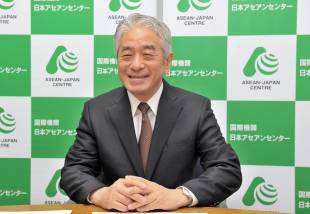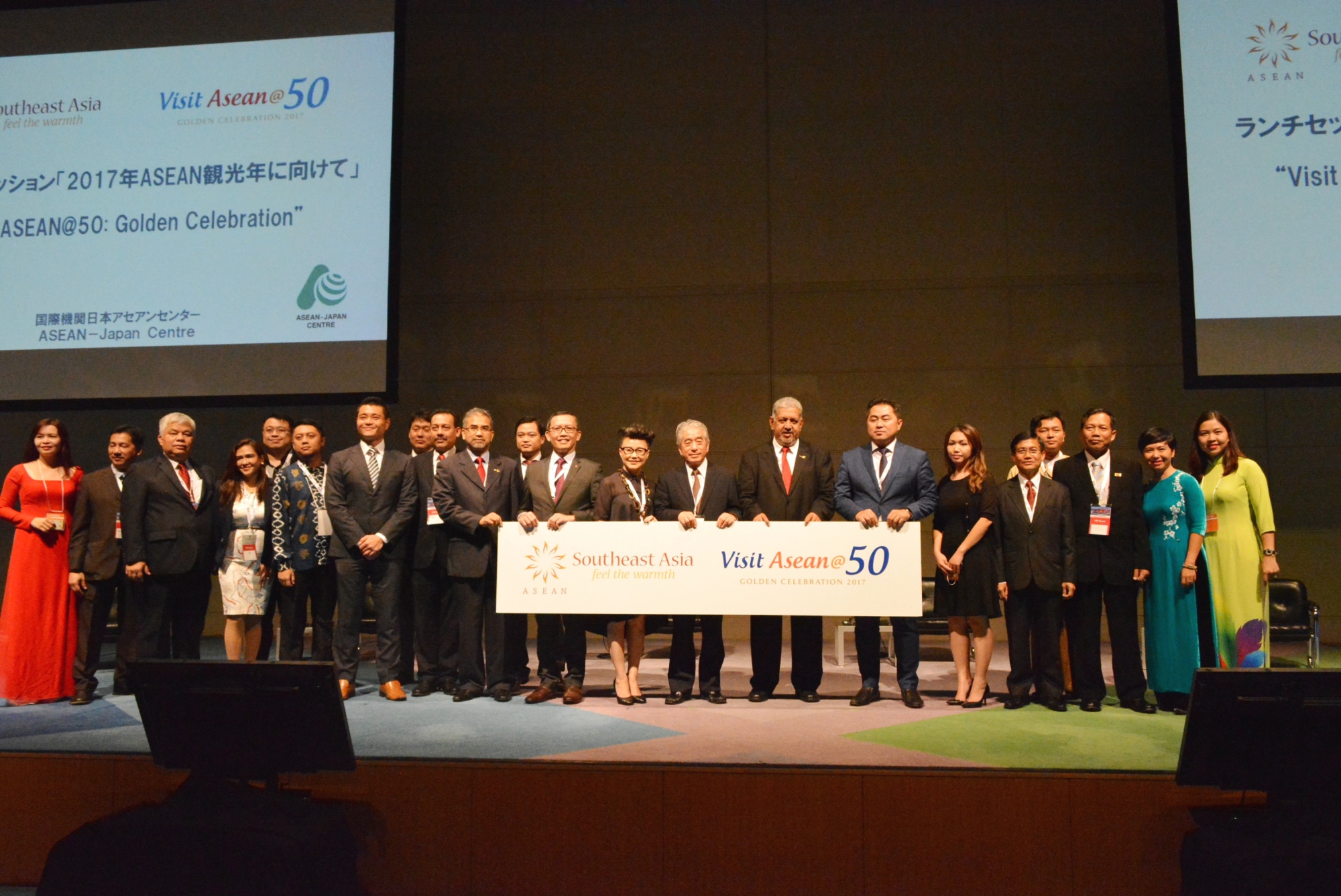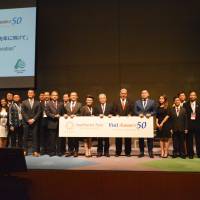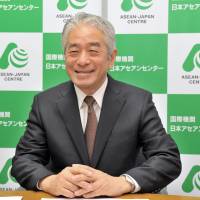The year 2017 marks the 50th anniversary of the Association of the Southeast Asian Nations (ASEAN).
To celebrate this important milestone, ASEAN member states — Brunei, Cambodia, Indonesia, Laos, Malaysia, Myanmar, the Philippines, Singapore, Thailand and Vietnam— launched a campaign aimed at boosting the region's tourism and dubbed "Visit ASEAN@50: Golden Celebration (VA@50)." In support of this, the ASEAN-Japan Centre (AJC) is entrusted to encourage Japanese people to visit ASEAN member states.
"We've been holding many workshops and other events on tourism in various ASEAN destinations and will continue to do so," said AJC Secretary-General Masataka Fujita at an interview recently conducted by The Japan Times.
The AJC, located in Tokyo, is raising public awareness of the VA@50 campaign in Japan. It exhibited at the Tourism EXPO Japan, organized by Japan Association of Travel Agents from Sept. 22 to 25, where it spread the word on the campaign and worked to promote tourism in the ASEAN region.
In the Asian Tourism Leaders' Forum, one of the expo events, the AJC held a lunch session in which an ASEAN Secretariat representative delivered a presentation on planned activities for VA@50 with the presence of ASEAN tourism officials.
The AJC also organized a workshop on accessible tourism for those management-level tourism stakeholders from Brunei, Cambodia, Indonesia, Laos and Malaysia in Tokyo and Toba, Mie Prefecture, from Oct. 23 to 29.

Accessible tourism means tourism that is available for everybody, regardless of their physical limitations, disabilities or age.
This is in line with the "Tourism for All" slogan noted by then-U.N. Secretary-General Ban Ki-moon and World Tourism Organization (UNWTO) Secretary-General Taleb Rifai in official messages for World Tourism Day on Sep. 27.
Tourism is one of the industries ASEAN member states are working to promote. The number of foreign tourists in the region doubled to 105 million in 2014 from 51.3 million in 2005, according to the ASEAN Secretariat.
However, in terms of Japan-ASEAN tourism, both the numbers of ASEAN travelers and its share in total tourists in Japan have increased, while in the ASEAN region there is a relative decline in the share of Japanese travelers over the same time amid increasing absolute numbers.
Tourists originating in ASEAN member states made up 10.7 percent of overall tourists in Japan in 2015, up from 7.8 percent in 2005. The percentage of Japanese tourists traveling to ASEAN member states was 4.4 percent in 2014, down from 7.1 percent in 2005.
"The importance of ASEAN in Japan's market is getting bigger and bigger, while the presence of Japan in the ASEAN market is showing a relative decline," Fujita said. The trend can be found not only in tourism, but also in trade and foreign direct investment (FDI).
This does not mean that Japan is losing its importance, but that it needs to change how to deal with ASEAN as the economic balance between Japan and ASEAN has been changing.
"Nowhere else in the world can I see dynamic growth at the level ASEAN enjoys," Fujita said. "It's no longer that Japan is helping out ASEAN, but it is becoming that Japan and ASEAN are literally equal partners."
ASEAN's relationship with Japan was not ideal in the beginning due to Japan's over presence in Southeast Asia. In the 1960s and 1970s, Japan's accelerated pace of trade and investment activities in Southeast Asian countries caused contentious economic relations leading to political concerns between the ASEAN member states and Japan.
The turning point in the relations came in 1977 when then-Prime Minister Takeo Fukuda announced the Fukuda Doctrine.
The Fukuda Doctrine came out of a speech in Manila in 1977 when Fukuda pledged that Japan would never become a military power and that Japan would build up a relationship of mutual confidence and trust with Southeast Asian countries. He also said that Japan would cooperate positively with ASEAN member states in their own efforts as an equal partner.
Since then, the Fukuda Doctrine became the principle of Japan's diplomacy in Southeast Asia, and the relations between the two parties improved.
The AJC was founded in 1981 to realize the Fukuda Doctrine. It has been working to strengthen economic partnership between the ASEAN member states and Japan in trade, investment and tourism, as well as exchanges of persons.
Over the years, the ASEAN member states have made a remarkable economic progress, which has caused an economic rebalancing between them and Japan.
In the 1980s, Japan's gross domestic product was roughly 10 times as much as ASEAN's 10 states combined. Currently, the ratio is 2:1. In terms of the purchasing power parity, the ASEAN GDP has already surpassed that of Japan.
In trade, ASEAN's reliance on Japan has been decreasing. According to the ASEAN Secretariat, Japan accounted for 11 percent of ASEAN's imports in 2015, compared to 25 percent in 1995, with the value being 1.6 times higher from $79 billion to $125 billion.
Meanwhile, ASEAN accounted for 15 percent of Japan's imports, which almost doubled to $98 billion in 2015 from $48 billion in 1995. The number was 14 percent in 1995, according to Japan's Ministry of Finance.
In terms of FDI, Japan accounted for 15 percent of ASEAN's inward FDI, which quadrupled to an annual average of $19 billion between 2013 and 2015 from an annual average of $5 billion between 1995 and 1997, according to the ASEAN Secretariat.
By contrast, ASEAN accounted for 21 percent of Japan's inward FDI, which surged 18-fold to an annual average of $1.5 billion between 2013 and 2015 from $80 million in between 1995 and 1997, according to the Bank of Japan and Japan's Ministry of Finance.
Looking ahead, Fujita expects ASEAN will be showing its strength in the world economy, and Japan should retain an amicable relationship with ASEAN to harness it, he said.
"Japan can help ASEAN member states in environmental technology and other areas," he said, adding that Japan should aim to make investments in line with the U.N.'s Sustainable Development Goals, an initiative to achieve 169 targets across 17 goals, including poverty eradication and equal education.
"Direct investment is not only about money. Management know-how and other things such as access to markets and technology should come in the same package. Investments that are beneficial to not only investors, but also local economies will become very important," he said.
He also pointed out that the reliance on services in the ASEAN economy has been increasing rapidly, and Japanese businesses should act accordingly to take advantage of this growth by exporting and investing in the services industry, including software and data services.
In another current trend, internationally renowned brands such as Nike and Adidas, as well as some electronic companies, do not principally own their factories in the ASEAN region and are rather contracting production to local manufacturers, a practice known as non-equity modes of production.
"This means ASEAN manufacturers are getting stronger, making high-quality products with high levels of precision at low cost. Japanese companies must adapt to this situation," Fujita said.
Partaking of the evolving ASEAN-Japan relations, Fujita said that the AJC is expected to play a new role to further enhance ASEAN-Japan relations as equal partners, and is required to implement timely activities that well reflect their needs.
He continued, saying that as the only inter-governmental organization created within the framework of ASEAN and Japan, the AJC will step up its efforts to enhance the ASEAN-Japan economic partnership in this milestone year.





